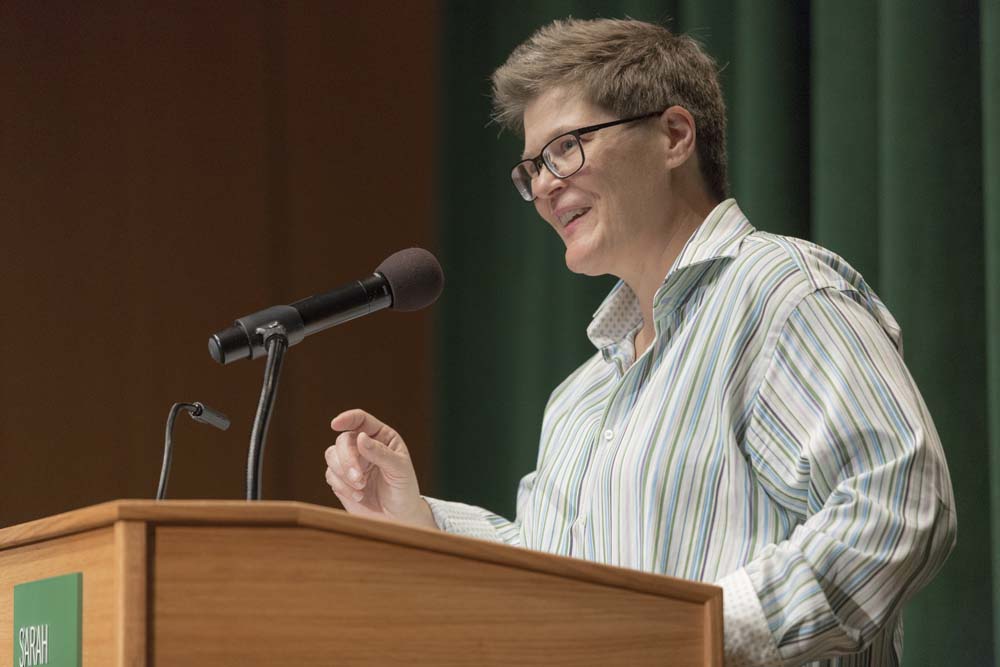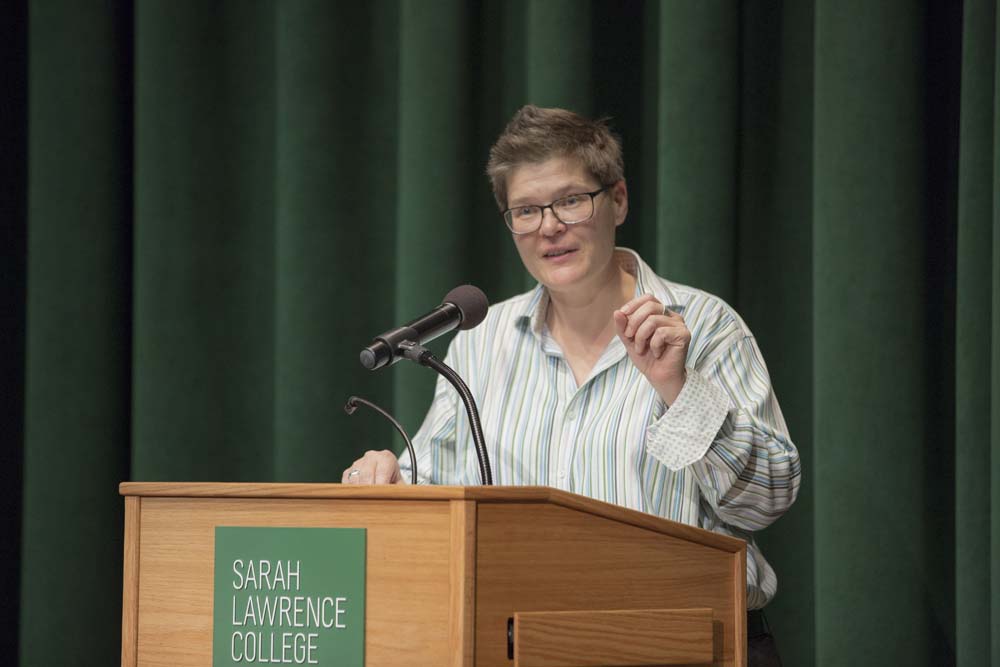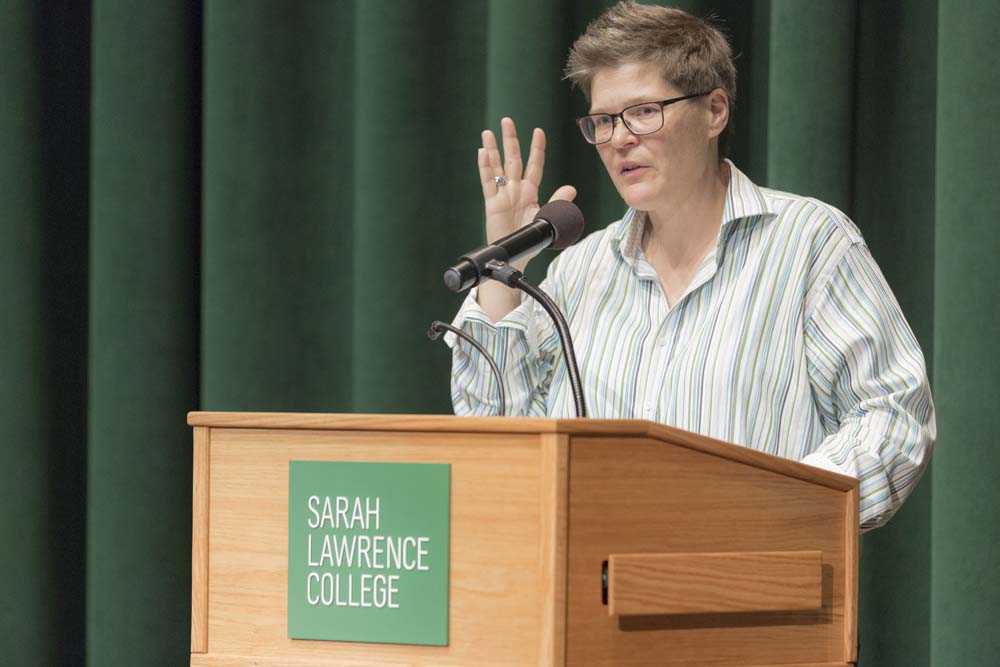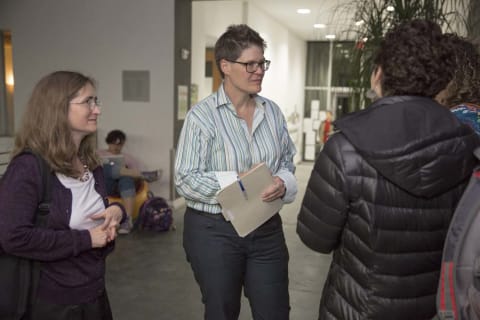February 20, 2018
In 1997, Kyes Stevens MA ’99, MFA ’00, then a candidate in the Women’s History graduate program, approached Thomas Lux, the then-director of the Graduate Program in Poetry, and asked him to read poems she’d written about a traumatic experience she’d had as a volunteer firefighter. Stevens’ intention was to “use poetry as a mechanism to sort things out.”
 “These poems are not very good,” Lux said. “But you have potential and that’s all you need…do you want to join our program?”
“These poems are not very good,” Lux said. “But you have potential and that’s all you need…do you want to join our program?”
That exchange would prove pivotal for Stevens, who went on to complete her MFA in poetry and subsequently found the Alabama Prison Arts + Education Project (APAEP) at Auburn University in 2002. The program currently serves 10 of the 15 major prisons in Alabama, providing pre-college and college-level courses for credit, and has received national acclaim for its quality programs.
“Tom opened a door,” Stevens emphasized. “Had he not opened that door, I wouldn’t be here.”
On February 20, Stevens, currently the director of APAEP, visited campus to deliver Education and Prison (Lynd Colloquium), part of the Inaugural Year Speaker Series exploring Democracy and Education. Prior to the lecture, she also met with a group of faculty and students, many of whom participate in the College’s Right-to-Write Program, which holds writing workshops at Westchester Correctional Facility.
At the lecture, Stevens told a rapt crowd of students, faculty and staff, “All along the way, people invested in me… and it is clear that not everyone gets that investment, so my job is to give the gifts back.”
One such gift was an unexpected call Stevens received about a grant from the National Endowment for the Arts in 2001, asking if she wanted to teach poetry at Talledega Federal Prison.
 “I was the last stop on the bus,” Stevens said. “There were lots of other poets in the state of Alabama, but no one else wanted to teach poetry in prisons.” The life-changing opportunity would become the basis for APAEP.
“I was the last stop on the bus,” Stevens said. “There were lots of other poets in the state of Alabama, but no one else wanted to teach poetry in prisons.” The life-changing opportunity would become the basis for APAEP.
Growing up and coming out as queer in Alabama, Stevens was well aware of cultural stereotypes and how others deemed different were judged. She said, “I was familiar with the ‘othering’ process and so when I stepped into prisons, I just came in to teach poetry….”
Instantly, Stevens discovered that the students liked to interact with poetry the same way that she liked to interact with poetry, having “very intense interactions with words and language.”
Stevens went on to teach poetry at Donaldson Correctional Facility, where one-third of the population is serving a sentence of life without parole, creating an atmosphere of “desperateness that is hard to communicate.” In her first course there, one of the students serving life without parole wrote, These halls smell of great desperation for understanding/ Somebody needs to stand up to these walls/They will have much compassion someday.
The student’s moving perspective made an impact on Stevens, who said, “It’s safe to say that I have spent every week of my life since thinking about that poem. If somebody who is in [the prison] system can see the potential for compassion, then we have no excuse [not to see it, either.]”
As APAEP blossomed, the course offerings expanded to include topics that the students expressed an interest in, including mathematics. The program is rooted in a philosophy of access to education as a basic right. As well, Lux’s support remains a part of Stevens’ motivation to open doors for her students.
 “It is a crisis when someone wants to go to school and they cannot,” Stevens said, later adding, “If we believe education is a fundamental right, why are there so many qualifications to receive an education?”
“It is a crisis when someone wants to go to school and they cannot,” Stevens said, later adding, “If we believe education is a fundamental right, why are there so many qualifications to receive an education?”
This point resonated with Rosie Nolan ’21, a participant in Right-to-Write, who said after, “Access is something I think about a lot. I’m so privileged to go to school here, and it’s easy to forget that so many people don’t even get close to this.”
Kyes Stevens MA ’99, MFA ’00 is the founder and director of the Alabama Prison Arts + Education Project at Auburn University, a program that serves 10 of the 15 major prisons in Alabama through pre-college and college classes. In 2016, through this program, the first Bachelor of Science degree for the Alabama prison system was launched. Stevens worked with colleagues across the country to build the foundation for the National Alliance for Higher Education in Prison and has also been involved in the development of a national organization to support artists who teach in corrections. In addition, with colleagues from around the country, Stevens met several times with members of the Obama administration at the White House to discuss the role of higher education in criminal justice reform. Stevens earned her MA in Women’s History and MFA in poetry from Sarah Lawrence College. She is a poet who was awarded a fellowship from the National Endowment for the Arts and the Department of Justice to teach poetry at the Talladega Federal Prison in 2001 and built APAEP from that experience. She has completed eight residencies at the Lillian E. Smith Center for Creative Arts in Clayton, GA and was a co-recipient of the first Lillian E. Smith Writer in Service award. She received the Auburn University Young Alumni Achievement Award in 2012 and an Auburn University Women of Distinction Award in 2010. She was the 2014 Alabama State Council on the Arts Literary Arts Fellowship recipient and, in 2016, was recognized as an Al.com Woman Who Shapes the State. She was also selected as a 2016 Southerner of the Year by Southern Living.
Kyes Stevens is from Waverly, Alabama, where she resides with her partner, clarinetist and professor Lisa Oberlander (Columbus, GA). In addition to serving on her town council and working for the volunteer fire department in the past, Stevens is dedicated to animal rescue, and shares her home/land with a whole slew of rescue animals, including dogs, cats, chickens, and a donkey.
